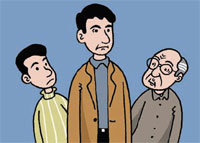Age criteria for youth
Age criteria for youth
Posted April. 17, 2018 08:16,
Updated April. 17, 2018 08:16

Korean writer Choi In-ho wrote novel series “Family” on monthly magazine “Saemteo” for 34 years and six months from 1975. The writer painted his life from the age of 29 to 64 in the novel. Through a variety of episodes seen from the perspective of a father, the writer himself, readers could get a glimpse of changes both in family and society. One of them is the writer, “a breadwinner in his 30s,” defines himself as a “middle aged man” and feels a sense of responsibility to support his family.
Is it that past generations were so much more mature mentally, socially and economically than the current generations? Or have medical developments made people biologically younger than those in the same age group in past generations? No one in his 30s would consider himself a “middle-aged man” these days. People in their 20s and 30s are all called youth nowadays. Hanyang University Professor Cheon Young-soo suggested in his book “Korea Going Extinct,” which looks into the demographic impact on economy, to divide population into three groups: youth (age 10-39), middle-aged (40-69) and elderly (over 70).
There is no uniform age criterion for youth set by government agencies and local governments. Youth, according to the Youth Employment Policy announced by the government last month, is those between age 15 and 34. Even though Statistics Korea and the Ministry of Employment and Labor say youth is those between age 15 and 34, under the Tax Reduction and Exemption Control Act, those between15 and 34 are eligible for the tax exemption benefits for youth startups. But the beneficiaries are expanded to age 39 under the Support for Small and Medium Enterprise Establishment Act. It gets worse when it comes to the ordinances by local governments. The age criteria for youth are between 19 and 24 for Seongnam City and between 19 and 55 for Gangjin County, South Jeolla Province.
This reporter is not sure how effective youth policies would be when there is no uniform criterion not to mention the limited budget. The age criterion for elderly, however, stays the same since 1964 at age 65. The Moon Jae-in administration defined those in 50s and 60s as neo middle-aged and promised to come up with employment support policies for them. To be sure, the government’s ambition to support all age groups is praiseworthy, but the problem is the practicality of those policies.




![연금 개시 가능해지면 年 1만 원은 꼭 인출하세요[은퇴 레시피]](https://dimg.donga.com/c/138/175/90/1/wps/NEWS/IMAGE/2026/02/20/133390850.4.jpg)
![취권하는 중국 로봇, ‘쇼’인 줄 알았더니 ‘데이터 스펀지’였다?[딥다이브]](https://dimg.donga.com/c/138/175/90/1/wps/NEWS/IMAGE/2026/02/20/133391101.1.png)

